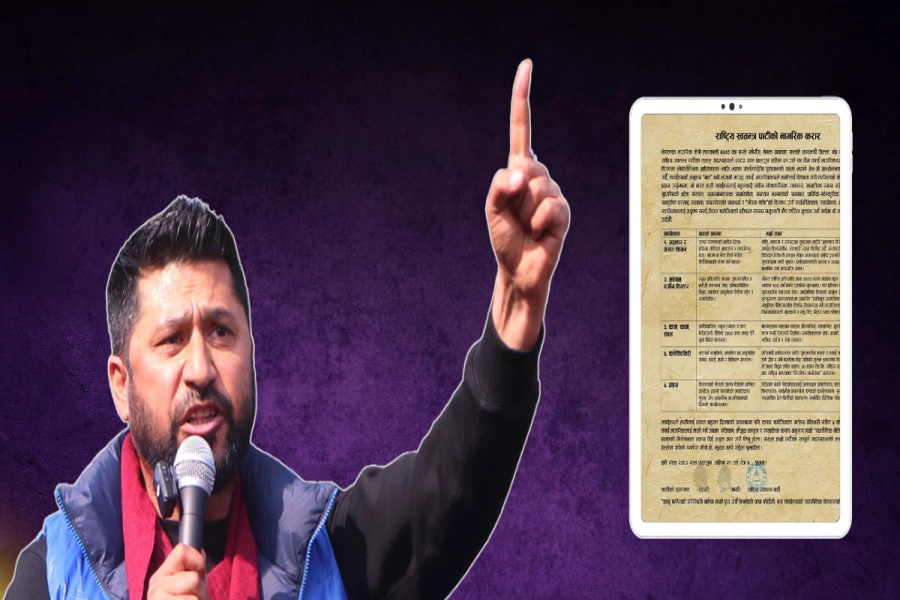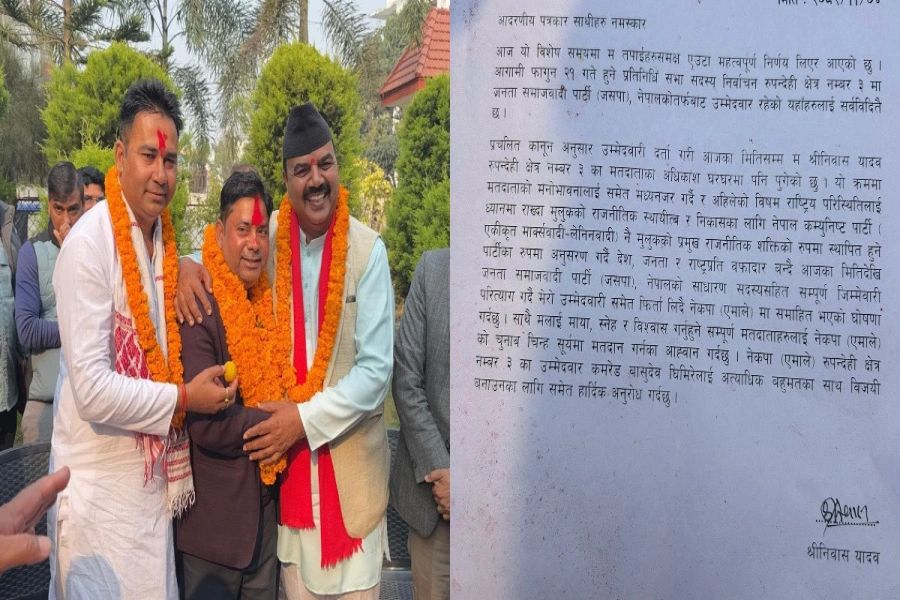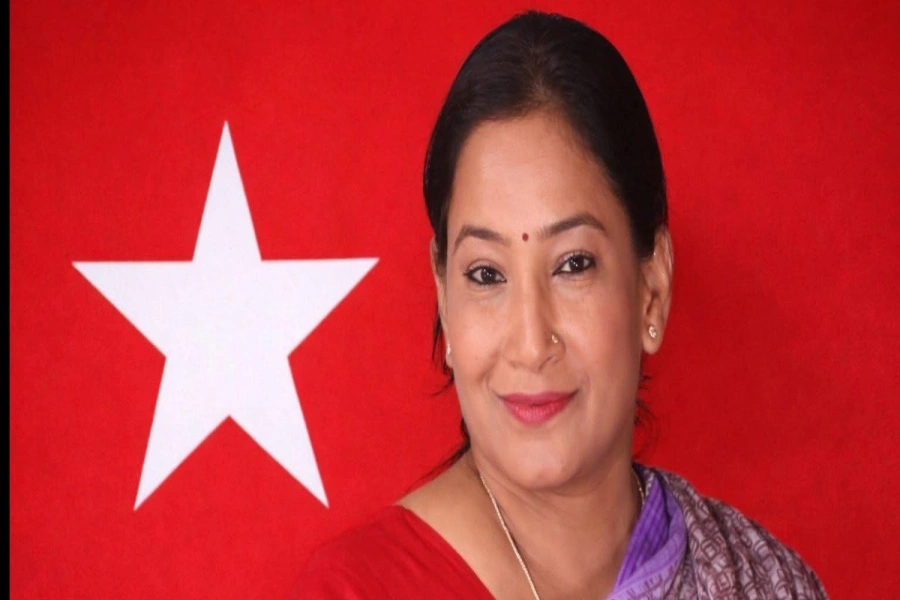Minister for Law, Justice and Parliamentary Affairs Ajay Shankar Nayak is an MP belonging to CPN (Maoist Center) from Siraha district. Nayak, who is a close aide of Prime Minister Pushpa Kamal Dahal, was actively involved in drafting the two constitution amendment bills (the one that has been withdrawn and the one registered in parliament last week). Republica’s Mahabir Paudyal and Ashok Dahal asked Nayak why the Madheshi parties were opposing the newly-tabled amendment bill, when it was aimed at taking them into confidence. And how will the government hold local election on May 14 in the face of Madheshi Morcha’s decision to disrupt election?
Why did the government bring amendment bills that were not in keeping with the demands of the protesting Madheshi parties?
Everyone knows why the government had to withdraw the first bill. Madheshi forces had rejected it outright and demanded corrections. Likewise, the main opposition CPM-UML was also vehemently opposed to it, especially over the provision related to alteration of provincial boundaries. So the government consulted all stakeholders including Madheshi forces and decided to bring the new proposal. After consulting with Madheshi Morcha we decided to leave the boundary issue to a powerful federal commission, as there was no possibility of UML supporting the first bill. The Madheshi parties had insisted on the use of the words ‘federal commission shall be formed based on the principle of inclusive proportional representation’ in the bill. They had also demanded that terms of reference (ToR) of the commission be clearly mentioned in amendment bill. CPN (Maoist Center) had no objection to the first demand. But when we discussed the kind of ToR that the Madheshi parties wanted, Nepali Congress and RPP did not agree to it. And so, finally, we settled for a federal commission of permanent nature.
Madheshi Morcha says the government brought the second amendment proposal unilaterally, just the way it had proposed the first amendment.
That’s not true. Yes, we could not retain the exact words Morcha leaders had suggested. But this is not something that Maoists or Nepali Congress can settle by themselves. It also depends on the current balance of power in parliament. Again, it is not yet clear whether the main opposition will endorse this proposal. In this situation, the Madheshi parties should have backed the bill, and let the parliament deliver the final verdict on it. They are not ready for this either. The new bill is not exactly what they wanted but it has tried to accommodate their concerns, as far as it was possible to do so.
Besides, the new bill has only been registered. May be we can accommodate more of the concerns of Madheshi parties in course of deliberations. But they say they will not just boycott the election, they will even disrupt it. This is objectionable.
We did not bring the new proposal unilaterally. We had plenty of discussions with Morcha leaders.
The prime minister himself had told them that he is ready to retain the words they proposed, but for this he also needed to take Congress and RPP into confidence. They then told the prime minister to first register the proposal and said that they would not oppose it. But when the government did register the bill, they announced new protests. We had not expected this response. Even now, the government has been telling Madheshi Morcha that it is open to holding election in some places, including Province 2, in second phase. The government is flexible. Yet they continue to be stubborn.
Ruling parties propose deferring polls yet again

Madheshi Morcha is unhappy about provision to take consent from concerned provinces to alter federal boundaries either.
There is a provision in our constitution to take the consent of the majority of federal provinces while changing provincial boundaries. To address the Madheshi demand, we added a provision in the new bill whereby the existing legislature parliament can also alter provincial boundaries. This means if this parliament does pass the bill to alter boundaries of Province 5 or Province 4, their consent won’t be necessary. Madheshi parties say this provision is ambiguous. I don’t understand their logic. Legal documents use legal language.
Based on what you have told us so far would you say that the Madheshi parties are not confident about their electoral prospects?
Not really. But their recent public posturing has made us suspicious. They do not seem ready to face the people. They seem bent on taking the country on a difficult path. Madheshi Morcha should reconsider their decision, come for meaningful dialogue and participate in the local election. We are flexible. It is important to hold local election in Madhesh so as to expedite development works there; Madhesh lags far behind in development compared to the hills. There are no motorable roads in many places. You could build 30 kilometers of road in Madhesh with the budget to build 10 kilometers of such a road in the hills. If you go to Dalit settlements, it will bring tears to your eyes.
They live in abject poverty, without food, clothes and shelter. We are going to hold local election after 20 years so that these poor and marginalized communities are empowered and their vital needs met. Those who oppose election cannot be considered real representatives of Madhesh. People have high hopes for development, employment and prosperity. If we cannot address at least some of these aspirations, we will all fail. Madheshi leaders should understand this.
Madheshi Morcha argues that it was not taken into confidence since the time of the constitution’s promulgation in 2015. How will holding local election without taking them into confidence help with constitution implementation?
Let me begin by giving you a brief sketch of the constitution-making process. Madheshi Morcha was not in favor of promulgating the constitution. We were worried about the dire consequences if the second Constituent Assembly, just like its first avatar, also failed to promulgate the constitution.
People across the country were frustrated at such slow progress in constitution-making. We decided that we should not repeat the mistake of the first CA. So we gave up our stands on certain issues and promulgated the constitution. But the Madheshi parties walked out of the CA. This was a big mistake. If they had stayed in, some of their demands could have been addressed because power balance was different at the time. Congress and UML were in the government. We were in opposition.
When the government in January 2016 amended the constitution to address Madheshi demands, the Madheshi parties refused to own that amendment too. Now that the government has done what it could to get the desirable amendments, they have again announced protests. All this makes me think they are secretly wishing this constitution fails and the country remains in perpetual transition. It raises the question of what they really want. Madheshi Morcha is behaving as if it commands two-thirds majority in the parliament. It is clearly not in favor of institutionalizing the achievements of the new constitution and taking the country on the path of peace and stability.
What is your assessment of the mood in Madhesh? Are Madheshis opposed to local election?
People in Madhesh want election. Madheshi parties want to impress on common people that they are the real representatives of Madheshi people and that there should be no space for Maoists or Congress there. Even if all Madheshi parties unite and contest the election together, the coalition, in my reckoning, will come third even in Madhesh. If they contest separately, some would even lose their existence. This is the ground reality. Madheshi parties tell us that Madheshi people are not prepared for election. This is another lie. Forget UML, Congress and Maoists, even their cadres are excited about election and are preparing for it in their own way. People are least bothered about agitation. They are even canvassing for election. The leadership has put them in a difficult position by foisting protest programs. I have seen it for myself as I come from Madhesh.
The prime minister has said he is under immense pressure to defer the May 14 election. Who is exerting this pressure?
The government is clear about one thing: It will hold the local election on the stipulated date. The only other option is to hold the election in two phases, if it guarantees Morcha’s participation. But there is no question of deferring the entire election.
As for pressures, if you closely watch the behaviors of some parties you must know who are putting pressure on the prime minister to defer the election. In fact, there are pressures from all sides.
Some are protesting for election symbols. Others have threatened not to participate in local election by raising the issue of the Election Commission’s meddling of their party statute. Even within the government, the main coalition partner, Nepali Congress, is constantly changing positions.
Congress leaders from Madhesh have openly called for deferral. But government will hold the election on time because it is constitutionally bound to do so.
If the Madheshi Morcha simply refuses to come on board, what will the government do then?
The government believes the Madheshi parties will eventually take part in the May 14 election. They seem to have calculated that protests would help them consolidate their strength in their constituencies. They had done so before the 2008 CA polls as well. They had intensified protests in Madhesh from the day of opening of filing of nominations of election candidates. Then the government signed an agreement with them and they participated in the election. They then won many seats in Madhesh. They seem to be trying to use the same strategy this time as well because internally every constituent party of Madheshi Morcha is preparing for election. They tell us in private conversation that they are working to finalize the names of candidates so that they can join the election fray at the last moment. Perhaps they are thinking of fomenting unrest for a few days so as to consolidate their base. Again, I am sure they will ultimately come to election.
Election is the need of the hour. People want it. All the parties need to be on the same page, to allow people to vote for their representatives. This election is all about empowering people. Let us not create hurdles. I also appeal to the international community to contribute to holding local election successfully.





































